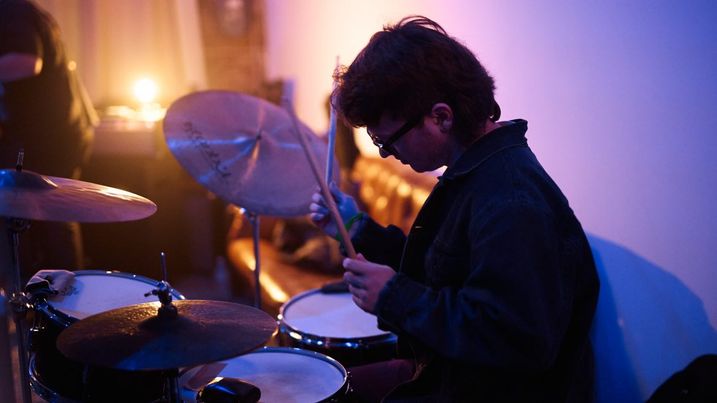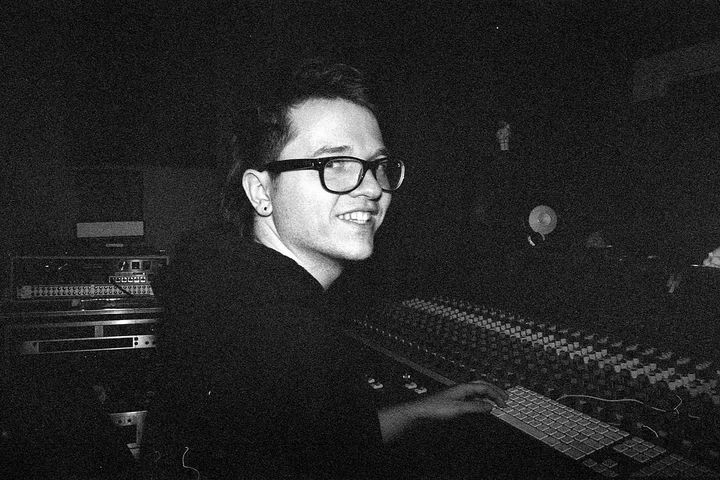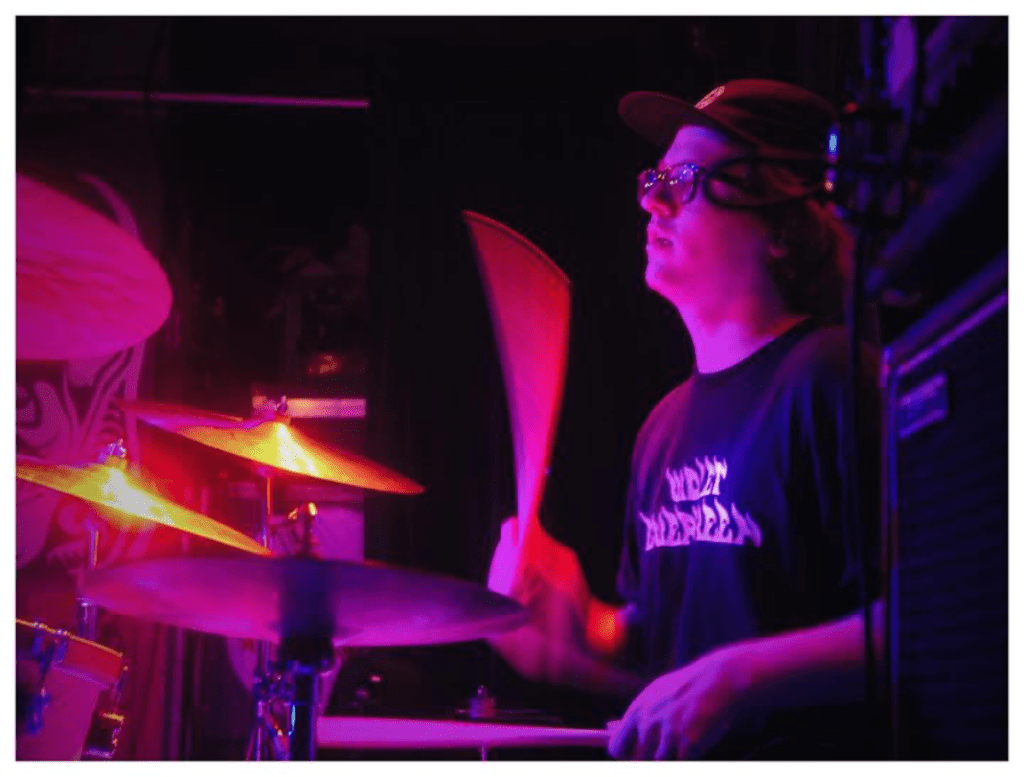On a chilly February night, some of the most dedicated local music fans pile in for a floor show at a small grunge venue, Baltimore’s Ottobar. Tonight it’s a stacked indie bill and not one person seems to trickle in late, as they don’t want to miss a minute of the long night of live music ahead.
When the first band, Lean Tee, takes the floor and begins playing, the mood of the room shifts from anticipation to excitement. Connor LeFevre ’23, music technology, sits behind the drum kit in the center. Lean Tee’s music is full of hard-hitting drum beats, but LeFevre easily supports the rhythms of the guitar and bass without overshadowing either. His sticks complement the unmodulated and fervent sounds of the vocals.
This show and this energy represent a pretty typical night for LeFevre, as he has completely centered his life around music—a career move, he said, made possible by his major at UMBC, which gave him full-time access to recording spaces and instructors who remain active in their musical fields.
Finding the rhythm of Baltimore’s music scene
Originally from New Jersey, LeFevre had to do some groundwork to find his way into the Baltimore music scene. He is currently a drummer for multiple local Baltimore bands—he wields his sticks for Lean Tee (indie rock), Love For Strangers (prog rock), and Curver (shoegaze), to name a few. He also works at a Hampden, Baltimore, music studio, The Moose House, as a junior engineer.
“Drumming is really fun for me, especially with bands that I’m fully involved in. But bands can be a lot,” says LeFevre. Playing so many different gigs requires him to memorize sets on tight turnaround times. “But recording is a lot less stressful. The client’s paying a lot of money, so you want to deliver them the best product possible. but it’s calmer in the moment because it’s a lot of smaller, micro decisions,” he says.
LeFevre goes for an uncomplicated personal style—usually a baggy t-shirt, hat, and glasses, easily fitting in with musicians in the indie scene. And while he may come off as laid back, music is something he takes seriously. He has been playing drums for roughly 10 years and first became interested in recording when he was in high school. “That’s when I bought my first recording interface and the first set of mics. And that was just to record drums to make demos,” he says. Eventually, he knew music tech was something he wanted to study in college.
Making musical connections
A deciding factor for LeFevre in attending the music technology program at UMBC was the studio space provided for students. “You have 24-hour access to the studio and you can use it for anything you want once you reach a certain year,” LeFevre says, and this alone made it worth it to come out of state. “Once you’re a sophomore in the program, you can use the whole thing—whenever you want, for free!”
LeFevre credits UMBC for making multiple connections for him. For one, he met all of the original members of Love For Strangers at UMBC. He says, “When lockdown started loosening up, I wanted to start a band, and I saw Jeff Hirshman during a Zoom class—he was practicing during class—and I was like, ‘Oh, that’s the person I want to be in a band with!’ Because they don’t care about anything but music, obviously.”

Hirshman, now the band’s main songwriter, recalls their encounter similarly, and after jamming together for the first time, they decided to start making music together. “I met Connor because we were in the same online music theory class during COVID,” says Hirshman ’24, music technology. “I would practice guitar in class, and he thought I seemed like a good rock guitarist. So he DM’ed me, and we met with a bassist and jammed, and we started writing music right away.”
Hirshman humorously remarks, “He was the first drummer I ever met who cared enough about drums to clean them.”
The community makes the program
During his time at UMBC, LeFevre appreciated the styles and output of many of his music technology professors. “Eric Taft, Alan Wonneberger, and Greg Kalember—all three of them had works that I really respected. Eric made a lot of records that had a big impact on me as a kid growing up,” says LeFevre “And then, Greg did things like the Pokémon movie soundtrack. So, a lot of the things they’d done, I had heard in my life without even knowing.”
Along with his professional accomplishments, Kalember brings his enthusiasm for teaching into the classroom. While he acknowledges that there are many new challenges in the ever-changing music tech industry, Kalember notes that the music community at UMBC presents an antidote to some of these modern problems.
“There is no substitute for being part of a music-making community every day for four years. You don’t get that on YouTube, or by working by yourself on your laptop,” says Kalember.
“Students will learn more by osmosis—by being around other students and faculty over their years here. There are all sorts of lessons to be learned about networking, being part of a collaboration, putting together a project and seeing it through, trying to convince other people to get on board with your vision, and setting your personal opinions aside in order to realize someone else’s creative vision,” says Kalember. “These are all key skills that I believe students need when trying to go out into the music industry.”
The music technology program gave LeFevre the ability to combine his outside projects with what he was learning in the classroom. For his senior project, he recorded a live video for his band Love For Strangers. “We recorded that at school,” he says, “and then the album that we’ve been sitting on, I also recorded that at UMBC.”

Kalember emphasizes the hands-on opportunities UMBC provides, “To work in the facilities at UMBC is a great advantage for our students. They have access to multiple studio spaces—each with its own quirks and advantages—our concert hall, networked performance spaces throughout the building, and an amazing collection of instruments,” he explains.
Kalember is also delighted to see all that LeFevre has accomplished. “I can say that I’ve seen tremendous progress in his drumming since I’ve been here. He was good the first time I saw him play, but he’s really made some strides from there and is playing at a very high level now,” says Kalember. “He’s really bought into the idea that collaborating is a big piece of success in the music industry, and he’s been very generous with his time and talents throughout our program. Everything I’ve seen him do both at UMBC and outside of school, has been executed with professionalism and skill.”
The music doesn’t stop after graduation
LeFevre has always kept himself busy with his projects. “I’ve played, like, pretty much every rock venue in this city,” he says. And things have been no different after graduating. He soon expects to put out an album with his UMBC band Love for Strangers, and he has many shows booked throughout the next few months.
Since graduating, LeFevre has been able to utilize his degree and the connections he’s made at UMBC in many ways. Tom Lagana, LeFevre’s guitar professor, helped him to get into a wedding group called Bachelor Boys Band, which is one of the many ways he is able to make a consistent income playing shows. But aside from playing shows in a multitude of bands and working at The Moose House, he also enjoys teaching recording and drums, as well as doing electronic repairs.
Back at the Ottobar, for the entirety of Lean Tee’s set, it’s evident how much precision and control LeFevre commands over the kit, a skill that becomes even more apparent as the final notes linger in the air. After a second’s pause after the last beat, the audience applauds.
*****
LeFevre will be on tour with Lean Tee during April and will also be playing multiple shows with Curver and Love for Strangers throughout both April and May. LeFevre suggests keeping up with these bands and other local live music through @baltshowplace on Instagram and Tumblr.
Tags: Baltimore City, CAHSS, Music, music technology

